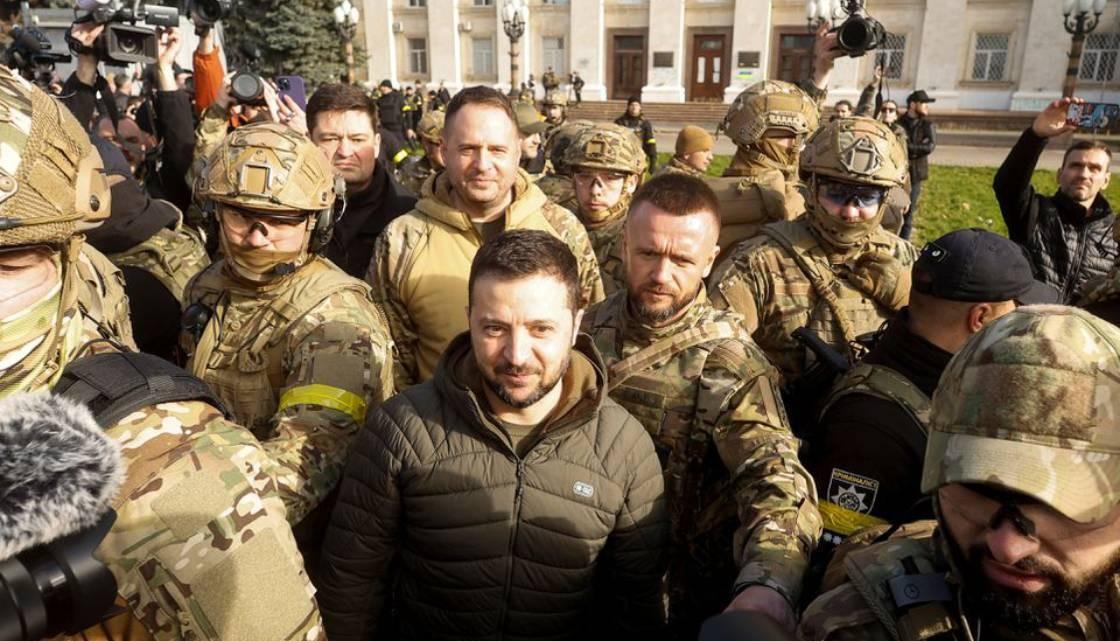Ukrainian President Volodymyr Zelenskiy on Monday (local time) visited Kherson, the biggest prize his troops have won so far, vowing to press on until Kyiv reclaims control of all its occupied territory.
Zelenskiy's visit came as the heads of US and Russian intelligence met in Turkey for the highest level publicly acknowledged face-to-face US-Russian talks since the Russian invasion in February.
Washington said Kyiv was aware of the meeting, which would focus on preventing an inadvertent escalation and not involve discussion of any settlement of the conflict.
Zelenskiy, in a casual grey winter jacket, shook hands with soldiers and waved to civilians looking out from surrounding flats as he was escorted by armed bodyguards through the Kherson streets, just three days after his troops swept into the city.
He told a gathering of soldiers that they had "proved it was impossible to kill Ukraine", then held a minute's silence for troops who died during the offensive.

Residents had also turned out, some with children or baby strollers, some waving Ukrainian flags or draped in them - a stark contrast with the early days of the Russian occupation in March when people gathered to berate Russian soldiers.
No senior Russian official had made an analogous visit during eight months of occupation of the city, which President Vladimir Putin proclaimed "eternally Russian" six weeks ago.
Speaking later to reporters, Zelenskiy said Ukraine was ready for peace, but only on its terms that would restore all occupied territory: "You see our strong army. We are step by step coming through our country, through the temporarily occupied territories."
Minutes before he arrived, nearby shelling could be heard, and after he finished speaking several more blasts of artillery echoed over the city.
Earlier, Zelenskiy said Ukraine had already gathered evidence of at least 400 war crimes committed by Russian troops during their occupation of the area, including killings and abductions. They left destroyed infrastructure and land mines littered behind them when they withdrew across the Dnipro River.
"Bodies of dead civilians and servicemen have been found," he said an overnight televised address. "The Russian army left behind the same savagery it did in other regions of the country it entered."
ABDUCTIONS
Russia denies its troops target civilians or have committed atrocities in occupied areas. Mass burial sites have been found in other parts of Ukraine previously occupied by Russian troops, including some with civilian bodies showing signs of torture.
Residents in and around Kherson interviewed by Reuters since Friday have described killings and abductions under Russian occupation.
READ MORE
- New Zealand extends Defence Force deployment in UK training Ukrainian soldiers
- Top US general estimates more than 100,000 Russian military casualties in Ukraine
- Ukraine denies Western pressure to soften stance on talks with Russia
- Ukraine says Russian troops loot, occupy Kherson homes as battle looms
Russian soldiers "would approach you in the street and ask if you were Ukrainian or Russian. If you said Ukrainian, they would take you away," Natalia Papernaya, a 43-year-old clothing designer, said on Sunday.
The Russians, she said, had arrested her friend for photographing a neighbour's home to reassure the owners it had survived a nearby shell blast. The troops had taped her friend's hood over her eyes, put her in a cellar for a day and demanded to know for whom she was taking pictures.
The friend was unharmed but heard other detainees screaming or shouting out praise for Putin under duress.
"There were many people in there, women and men," she said.
Yana Shaposhnikova, 36, another clothing designer, said a friend of hers had also been abducted and interrogated. She herself had buried her yellow and blue Ukrainian flag.
"If you wore anything yellow and blue you could be shot or invited into a cellar where you would be tortured," she said.
Earlier, Reuters reported one account of a neighbour shot dead and three accounts of people carried off by troops in the village of Blahodatne north of Kherson.
It was not possible to verify the accounts independently.
US-RUSSIAN TALKS
A White House spokesperson said CIA Director William Burns would deliver a warning at his meeting in Turkey with Russian foreign intelligence chief Sergei Naryshkin of consequences should Putin use nuclear weapons.
"He is not conducting negotiations of any kind. He is not discussing settlement of the war in Ukraine," said the White House spokesperson.
"He is conveying a message on the consequences of the use of nuclear weapons by Russia, and the risks of escalation to strategic stability," the spokesperson said. "He will also raise the cases of unjustly detained US citizens."
Putin has repeatedly suggested Russia could use nuclear weapons to defend its territorial integrity, interpreted in the West as an implicit threat to use them over lands Moscow claims to have annexed.
The Russian leader stayed away from a summit of the G20 big economies in Indonesia, sending his foreign minister, Sergei Lavrov, in his place. Reports that Lavrov was taken to a hospital caused speculation about his health, denied by Moscow.
The governor of Bali, I Wayan Koster, told Reuters Lavrov, 72, had gone to a hospital for a "check-up" but was in good health. Russia released a video showing Lavrov sitting outside in shorts and a T-shirt, denying he was ill.
Russia pulled all its troops out of a pocket on the west bank of the Dnipro River last week, which included Kherson city, the only regional capital it had captured since the February invasion. Ukraine's military said the Russians were continuing to shell the area from across the river.



